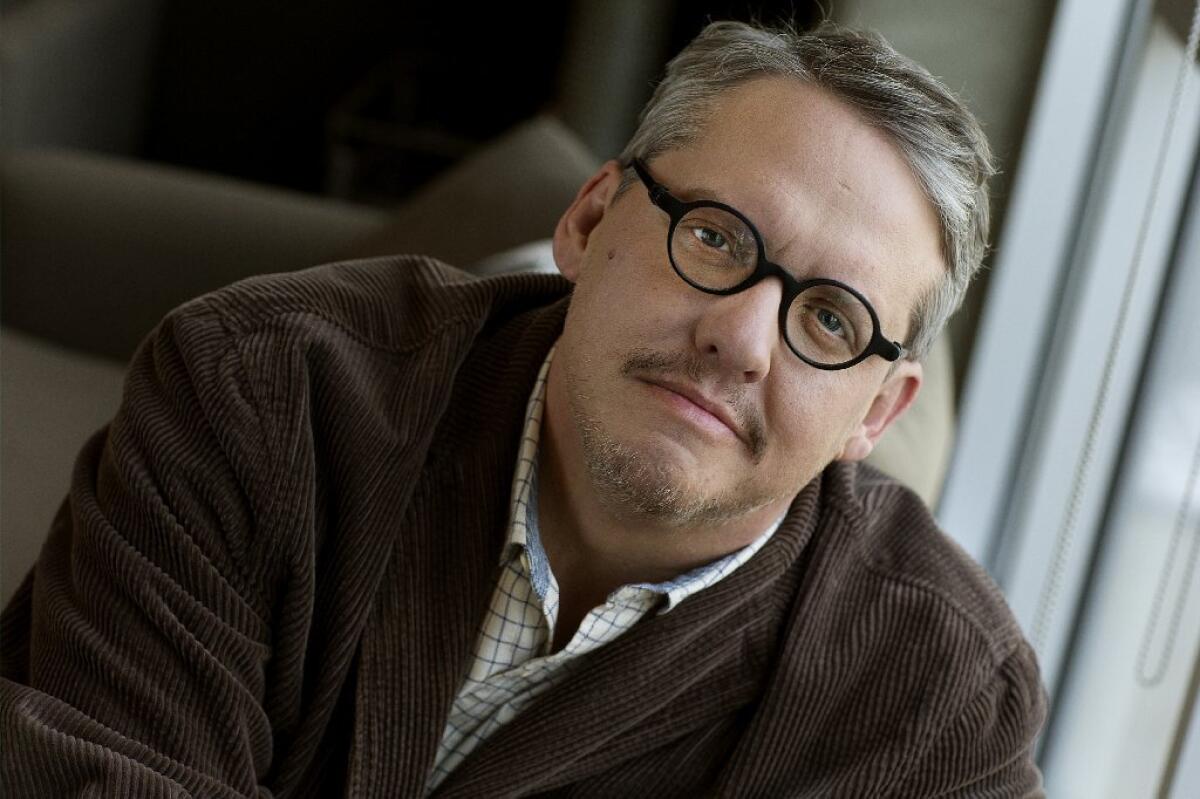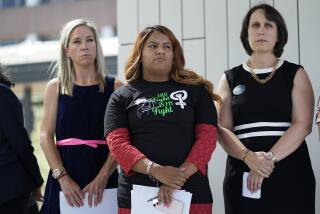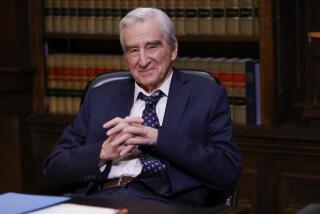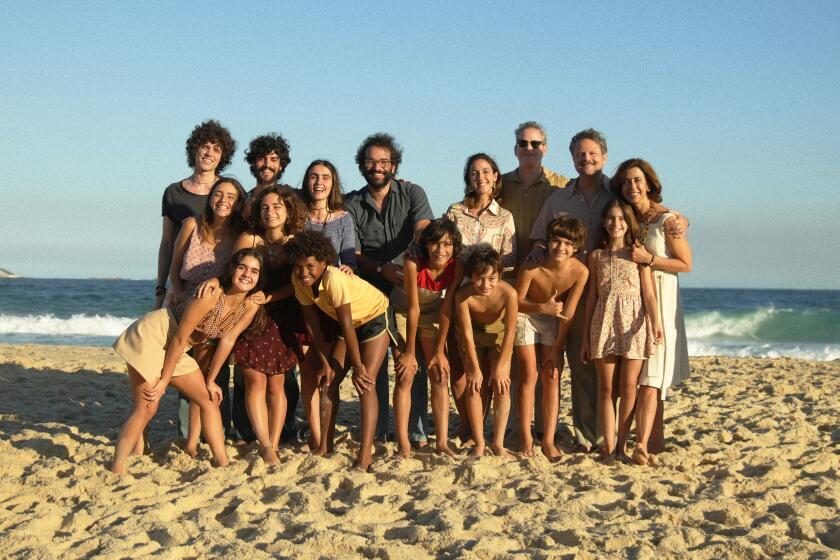Gold Standard: How Adam McKay brought unity to Congress for one night with ‘Big Short’ screening

Mr. McKay goes to Washington: Filmmaker Adam McKay screened his Oscar-nominated movie, “The Big Short” for Congress on Wednesday night and found a receptive, bipartisan audience.
Filmmaker Adam McKay had just finished introducing his Oscar-nominated movie “The Big Short” at a special screening in the Congressional Auditorium on Wednesday night and he figured he’d stick around, stand in the shadows and see how the film would play for the bipartisan audience of assembled politicians.
“Here’s the moment I knew we had a different crowd,” McKay said by phone, driving back to his hotel. “When Steve Carell says the line, ‘Who gets away with treating their clients like [garbage] and still does well?’ Beat. ‘Oh, besides Goldman Sachs?’ And the whole room roared bigger than I’ve heard any crowd laugh with this movie.”
Hours after it ended, McKay was still giddy from the evening, hosted by four U.S. senators: Republicans Roger Wicker and Johnny Isakson and Democrats Sherrod Brown and Jack Reed. The screening was attended by 450 people, including a dozen other members of Congress and representatives of various executive branch and congressional offices.
>>SIGN UP for Glenn Whipp’s Gold Standard newsletter
McKay left the auditorium 20 minutes into the screening, satisfied it was playing well. In the lobby, he bumped into South Dakota Sen. John Thune, who was hurrying toward the theater. Thune apologized for his tardiness, thanked McKay for showing the film and darted inside.
The right-left divide is the biggest scam that’s ever been perpetrated on America....We made this movie to transcend the partisan politics.
— ‘The Big Short’ director Adam McKay
“There were actually more Republicans than Democrats at the screening, which was doubly exciting for me,” McKay said. “I think everyone realizes the movie hits on a very serious truth.”
“Besides,” he added, “I think the right-left divide is the biggest scam that’s ever been perpetrated on America. Trillions of dollars have been siphoned out of our pockets over this stupid right-left distraction that’s been created by the moneyed interests. We made this movie to transcend the partisan politics.”
In early December, McKay was a bit worried about whether “The Big Short,” adapted from Michael Lewis’ best-seller about the 2008 economic collapse, would find an audience. Two months later, it’s an Oscar front-runner for best picture, a box-office success and, particularly satisfying for McKay, a movie that has become entrenched in the current presidential campaign for its portrait of the dangers of an unregulated Wall Street.
“The main reason I wanted to do this tonight is so that we don’t forget,” said Ohio Sen. Brown, the ranking Democratic member on the Committee on Banking, Housing and Urban Affairs. Brown noted that he and his wife live in a Cleveland ZIP code that, in 2007, saw more foreclosures than any other U.S. locale.
“It’s so important to see this movie,” Brown added, “to see the pain and the pain that human beings wreaked on other human beings because of what happened on Wall Street.”
The congressional screening marked McKay’s second foray to Washington this year, following a January trip that saw him meeting with politicians and economists and headlining an event at the Brookings Institution, a nonprofit think tank. McKay said he’s found people receptive to “The Big Short” in one-on-one situations, but more reserved and cautious in group settings.
“There’s a very specific system at work here and there’s a lot of money that’s flooded into this town,” McKay said. “It’s a fascinating place.”
Of the presidential candidates, only Bernie Sanders has publicly mentioned “The Big Short.” (Asked at a campaign event if he had seen the movie, Sanders replied: “Damn right I have. Excellent film.”) But McKay sees links to the movie’s outrage over banking fraud and unethical political practices in the campaigns of just about every presidential aspirant, including the outsider defiance of Donald Trump and Ted Cruz (“in no way a real reformer, but playing those chords to get a response,” McKay says of the Texas senator) as well as Hillary Clinton’s defensiveness over taking Wall Street money.
“This presidential election has been defined by a certain frustration with Wall Street and finance and banking and how much government has been bought,” McKay said. “Sanders is the most specific about it. He’s the guy who has the sharpest tip to his spear. But even though the Trump supporters have a dull tip to their spear and they’re not quite as focused on policy, the same anger is driving those people as well.”
Asked if Trump and spears should be mentioned in the same sentence, McKay laughed.
“There’s a 20% chance he does a press conference one day and says, ‘Let’s all get spears,’” McKay joked. “So that’s a fair concern.”
McKay, best known before “The Big Short” for absurdist comedies like “Talladega Nights” and the “Anchorman” movies, has kept his sense of humor in the midst of the serious discussions his movie engenders.
Noting during his introduction that “The Big Short” would be only the third movie to ever screen for members of Congress, McKay said if it were up to him, he’d switch it out for his 2008 comedy “Step Brothers.”
McKay paused, waiting for the audience’s laughter to subside.
“No ... that would be a really bad decision.”
ALSO
‘Revenant’ vs. ‘Spotlight’ vs. ‘Big Short’: Best picture front-runners sharpen their Oscar pitches
Review: ‘The Big Short’ somehow makes the ’08 housing collapse entertaining
The gamble on Adam McKay and ‘The Big Short’ looks like it might pay off
More to Read
From the Oscars to the Emmys.
Get the Envelope newsletter for exclusive awards season coverage, behind-the-scenes stories from the Envelope podcast and columnist Glenn Whipp’s must-read analysis.
You may occasionally receive promotional content from the Los Angeles Times.











